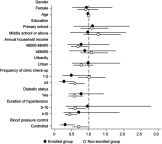Decomposing the effect of drug benefit program on antihypertensive medication adherence among the elderly in urban China
- PMID: 31371928
- PMCID: PMC6628968
- DOI: 10.2147/PPA.S201707
Decomposing the effect of drug benefit program on antihypertensive medication adherence among the elderly in urban China
Abstract
Purpose: Hypertension is a rapidly growing epidemic in People's Republic of China, yet it remains inadequately controlled. This study aimed to identify the relative contributions of program effects and patients' characteristics to the differences in antihypertensive medication nonadherence between drug benefit program enrollees and non-enrollees.
Patients and methods: Data were from a cross-sectional survey of 1,969 community-dwelling elderly adults with hypertension. Self-reported adherence was measured following previous studies in People's Republic of China. The Blinder-Oaxaca nonlinear decomposition method was used to identify the relative contributions of program effects and patients' individual characteristics.
Results: Eleven percent of the drug benefit program enrollees were nonadherent to their medication, while 17% of non-enrollees were. Blinder-Oaxaca decomposition identified that over 60% of the gap between the two groups was due to the program effects (P=0.024). The rest could be explained by differences in observable characteristics (P<0.001), such as diabetic status, duration of hypertension, and blood pressure control.
Conclusion: The study confirmed that drug benefit program enrollees were more likely to be adherent to their antihypertensive medication than non-enrollees in the context of People's Republic of China.
Keywords: decomposition; drug benefit program; hypertension; medication adherence.
Conflict of interest statement
The authors report no conflicts of interest in this work.
Figures



References
-
- Wang Y. Investigation and Prevention on Chronic Disease in China. Beijing: China Social Sciences Press; 2011:39–40.
LinkOut - more resources
Full Text Sources
Miscellaneous

